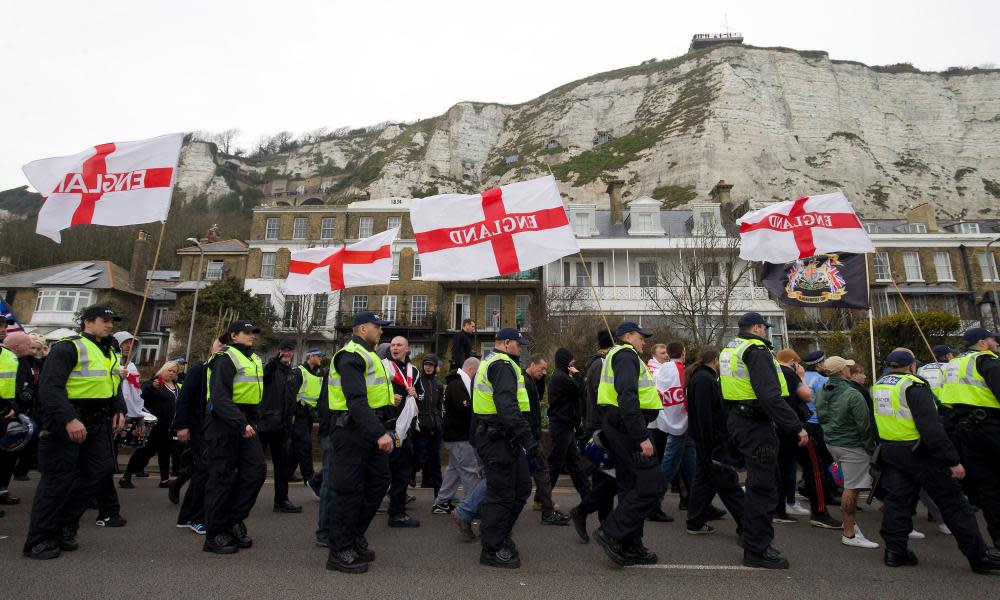Rightwing extremists involved in nearly a third of terror referrals

Almost one-third of all referrals to an anti-extremism programme are for people feared to have extreme rightwing views that could turn into violence, figures show.
Tuesday’s figures, published after a van attack on Monday outside a mosque in Finsbury Park, north London, echo claims by Muslims who say the danger posed by the extreme right – whether individuals inspired by propaganda or more organised groups – is growing.
The stats from the National Police Chiefs Council show 34 people were arrested last year for offences driven by an extreme rightwing ideology.
Of 402 arrests entered on the national terrorism arrest database between June 2016 and May 2017, 34 – 8% of the total – were flagged as extreme right wing (XRW).
Channel, which is part of the Prevent strategy and aimed at catching people before they turn violent, saw almost one-third of all people it dealt with after concerns that they had extreme rightwing views.
An NPCC spokesman said: “We are committed to tackling any and all ideologies which pose a threat to the public’s safety and security, and treat the threat from the far right in exactly the same way as any other toxic ideology used to spread mistrust and fear in our communities.
“However, the overriding threat to the UK remains from Daesh-inspired groups and individuals. That is borne out in the arrest figures, which show that between June 2016 and May 2017 the extreme right wing accounted for about 8% of those arrested for terrorism-related offences.”
In the wake of the van attack, the government is facing calls to treat Islamophobia as a hate crime that can lead to terrorist violence.
Muslims have long said anti-Islamic sentiment was being allowed to fester unchallenged. Miqdaad Versi, spokesman on security for the Muslim Council of Britain, said: “It is reassuring to see a serious change in rhetoric by our prime minister to not only recognising the threat from the extreme right wing but also to explicitly calling out Islamophobia as a form of extremism.
“For years, Muslim communities have been calling for action to tackle the growing hate and hate crime against Muslim communities, especially the tolerance of the spread of hatred on mainstream media.
“We hope that there will now be action to tackle all forms of hate equally and that the government will fairly engage with Muslim communities.”
The van allegedly driven by Darren Osborne ploughed into pedestrians in Finsbury Park, with a man believed to be its driver shouting “I want to kill all Muslims – I did my bit” after he was pinned down by some of his intended victims.
Dr Paul Jackson, an expert in far-right ideology at the University of Northampton, said the way Muslim communities were portrayed by some in the media created “a culture of licence”. He also said the extreme right were targeting Muslims.
Jackson said: “I think there is a very real problem in the way that neo-Nazi or white nationalist ideologies are seen as much more extreme or likely to lead to violent extremism when various cases have shown that Islamophobia can also lead to violent extremism.
“The idea of someone being violently radicalised by Islamophobia rather than anything else hasn’t been taken seriously enough by the state.”
Theresa May and the police have said the attack was terrorist. “It is violence motivated by a political cause – that is terrorism,” Jackson said.
Police say they treat extreme rightwing terrorism as seriously as other forms, including that from Islamists.
Diane Abbott, the shadow home secretary, said the Prevent strategy needed to be reviewed.
“There is a widespread distrust because it is felt that it targets just one community,” she said.
“Tragically, we see that there are multiple terrorist threats facing us, including the far right, al-Qaida or IS-inspired terrorists as well as others.
“We know that a large proportion of referrals to Prevent involve far-right or fascist terrorism, but it is far less clear whether this is reflected in the charging or conviction rates. Terrorism affects us all.”
In the short term, the support shown for Muslim communities in Finsbury Park was providing comfort.
Resident Nurten Kocoman, 50, herself a Muslim, said she felt overwhelmed by the support of the community.
“I don’t wear the headscarf, but I am scared for my mother who does,” she said. “But I am so moved by these messages of support from non-Muslims, people are speaking up, everyone has come together, it gives me comfort and it does make me feel safer.”

 Yahoo News
Yahoo News 
